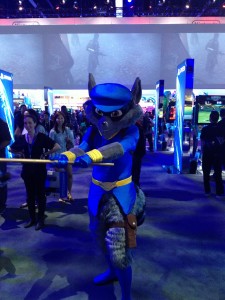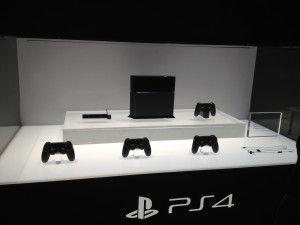Another Electronic Entertainment Expo has come and gone, bringing with it a taste of the new games that will be released in the coming year. A lot of interesting titles are making their way to the consumer, but as much as the convention focuses on upcoming games, the talk of the expo has probably got to be the consoles that made their official debut at E3 this year.
But as important as these next gen consoles are, E3 is about the games. And before I talk a little about the consoles that are elbowing their way onto the stage, I want to focus on some of the intriguing upcoming games that were shown off this year. After all, it’s what we’re all here for. Here are a few highlights that stuck out for me.
 [media-credit id=4745 align=”alignnone” width=”225″]
[media-credit id=4745 align=”alignnone” width=”225″]
Nintendo’s “Super Smash Brothers” is coming to the Wii U and 3DS next year, and everyone’s talking about the new fighters. Among them is the Villager from “Animal Crossing Universe,” and … the Wii Fit Trainer?
Nintendo adds the soft-voiced yoga master to the list of characters that will gather to beat the pixels out of each other when the new Smash Bros is released. A weird choice, perhaps, but totally in keeping with Nintendo’s lovably oddball track record.
High Moon Studios showed more of its Deadpool game, featuring everyone’s favorite sarcastic cult hero. Activision is publishing and it’s expected to come out later this month, originally having been announced at last year’s Comic-Con.
Following the humor trend is “South Park: The Stick of Truth,” which will come out sometime this year. The game offers the player the chance to create a South Park-esque character that looks like you, effectively making the player the fifth member of the notorious gang of fifth graders.
Aside from the big budget titles at E3, indie developers also are making a strong showing. Sony headed the indie charge this year with a multitude of games built by small developers, including Young Horses’ “Octodad: Dadliest Catch” and Supergiant’s “Transistor.”
But as great as these games look, it was the console wars that took center stage this week.
If you’re a gaming fan, and unless you’ve been living as a Luddite the last few weeks, you’ve probably heard about the controversial new policies of Microsoft and the Xbox One – retaining rights to the video game even after the consumer purchases it, enforcing strict lending policies, a mandatory internet connection and hourly account variation, plus a camera watching you that apparently never turns off, leading to privacy fears in some.
Sony, seeing their chance to gain an advantage, announced their answer to the Xbox One in the form of the PlayStation 4. The system gained major support with consumers when it not only eschewed the questionable policies and features of the Xbox One, but defiantly branded itself as ‘the gamers console.’
 [media-credit id=4745 align=”alignnone” width=”300″]
[media-credit id=4745 align=”alignnone” width=”300″]
Playstation even released a tongue-in-cheek video comparing their lending policy to Microsoft’s. This has been making the rounds online, but it’s still too early to tell exactly how the new policies will affect the market, and it would be crazy to count Microsoft out of the game.
I don’t want this to seem like I’m writing a column against Microsoft, but to be honest I don’t like what their policies imply for the future of the gaming market. Aside from the weird, George Orwell-esque camera that, because it’s constantly connected to the internet, has left consumers wondering if they would be open to hacking, I hate the idea of a restriction on used games.
As a college student I don’t always have the money to buy new games, and so taking away the used game market is effectively barring a certain subset of the population from being able to buy titles. The first video game I ever played was handed to me by my cousin, with the flippant “Here, I finished this.” It was Zelda for the original Gameboy, and it got me into playing games.
 [media-credit id=4745 align=”alignnone” width=”300″]
[media-credit id=4745 align=”alignnone” width=”300″]
But if Microsoft has its way this won’t happen anymore. Gone will be the days of finding old games at a garage sale and taking them home for an afternoon of nostalgia. It’s actually an incredibly depressing thought to me.
Luckily, Sony and Nintendo have, at least for now, rejected this new business strategy, with the president of Nintendo of America saying in an interview that if Microsoft doesn’t want to lose money on re-sold games, it should instead focus on making games people want to keep.
Go Nintendo.
The backlash online has been incredibly strong, so it remains to be seen how Microsoft will respond; whether it’ll tone down its policies or bank on the Xbox’s fan base for support.
